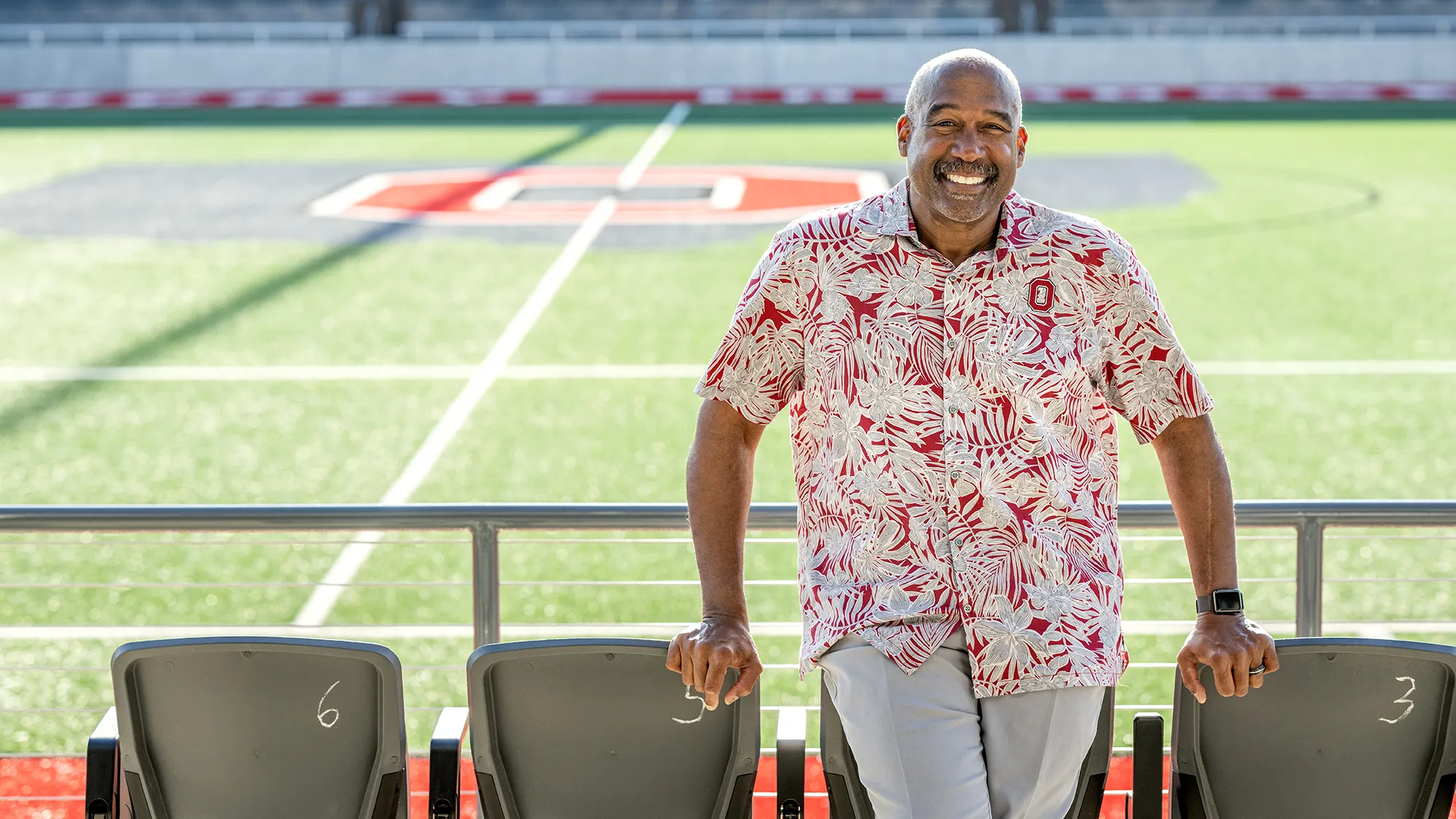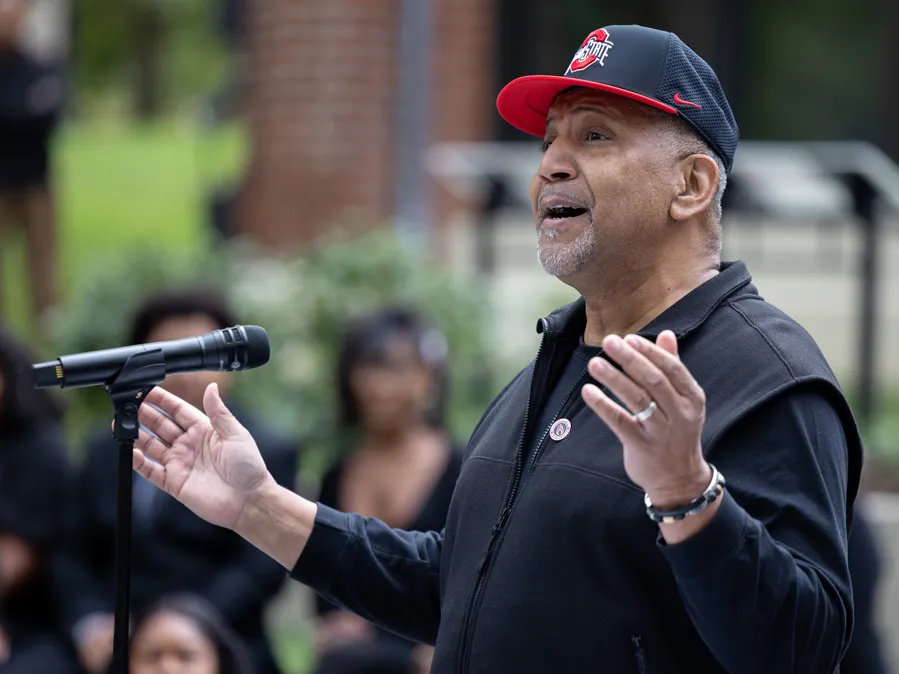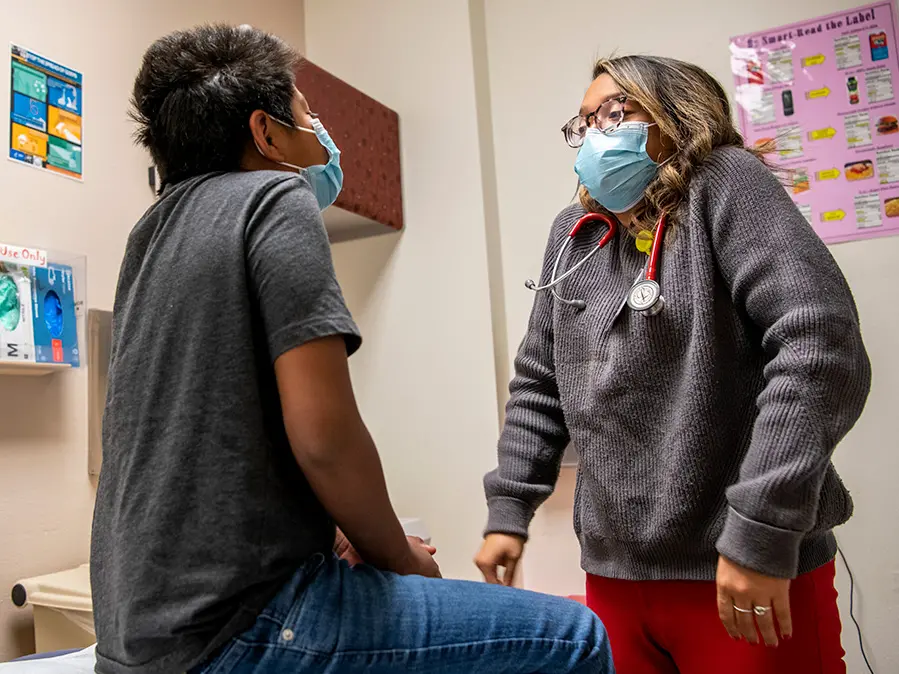
Gene Smith explains why he put everyone else first
Todd Jones: Gene Smith has always seen student-athletes as much more than players on Ohio State’s 36 varsity teams. He sees them as people — young Buckeyes he’s wanted to help succeed in the classroom and beyond, as well as in their sport.
That well-rounded view served as the cornerstone of Smith’s leadership during his 19 years as Ohio State athletics director. With his retirement approaching, Gene took time to talk with Ohio State Alumni Magazine intern Olivia Riley – a fourth-year journalism major from Frankfort, Ohio – about supporting the holistic development of student-athletes.
Olivia is beginning her second year as a member of the alumni magazine team, and she’s in her third year as a student assistant for the Department of Athletics.
We hope you enjoy her conversation with Gene Smith.
Olivia: Thanks Gene, so much for being here. I’ve seen it firsthand: how being a student athlete can require a time commitment comparable to that of a full-time job, almost, when you have practice and schoolwork on top of competition. How important is it to you personally to emphasize that student part of student athlete?
Gene: It’s important. That’s why you’re here. Using football as an example, there’s only 1% of them that are going pro. So, making sure that they understand, depending upon what they’re majoring in, what they learn in the classroom is going to be so important to them as they search for their opportunity to find gainful employment. So, it’s really important that they do everything that they can do to be the best student that they can be. Many of our football players are scholar athletes, those student athletes who maintain a 3.0, and having that on your resume is really a cool thing to say that you were a scholar athlete. And so that’s an important thing. So, I’m really glad that our football team as well as all of our student athletes are embracing that.
Olivia: And you not only put student athletes first in general, but you want to emphasize that you do it holistically. So, what does that really mean and why is that so important?
Gene: We have this blessing where parents or guardians give us their child and because they have a gift called athleticism, and so we want to help them develop that gift and be able to perform at the highest level with that gift. But we also — because of really what you said at the beginning around the time demands and things of that nature —we want to help them grow as people. Many of the leaders in our society came from athletics, and last year over 95% of our student athletes had employment, were going to grad school or were going pro. And so, what we want to do is help them grow as people, help them understand the lessons learned in sport. You use xa football team; all of those young people are from different environments. Their rural environment, urban environment, different socioeconomic environment, dual parent home, single parent home, there’s a couple international, white, black, all that diversity.
So, you just operate in that environment naturally. There’s a lot of young people that don’t have that experience. So, when you go to an interview, you should share that you [01:03:00] are willing and able to work with people from all walks of life because you’ve always done that. Or get to your earlier question about time demands. If you tell an athlete that you start at eight o’clock, and you’re asking what time they’re going to be there, they’re probably going to say 7 45. It’s a great opportunity to take these individuals and teach them life skills that otherwise wouldn’t be taught.
Olivia: So, Ohio State may be one of the largest athletic departments in the country, but like you said, it’s not all about sports. What are some ways and some programs that you help embody the holistic development of student athletes, both on and off the field?
Gene: Yeah, first Olivia, great question. What it gets down to first is our culture, where our coaches and all the support staff understand that that’s a part of our mission, part of our goals. But we have a number of different structured programs that our student athletes engage with. We have our student athlete support services organization where we have academic counselors that work with our student athletes to determine what their degree program they want to be. We have a number of athletes who come in and they know that what they want to major in, but we have people who will sit down with them and talk to them about, okay, what do you really want to major in? And then help them get on track. It’s hard for a student athlete to change their majors in their junior year, for example. So helping them determine that early is critical.
And then we have our leadership institute, which is a phenomenal experience for student athletes and many of them participate in it. There’s internships, there’s shadowing programs, there’s presentations that they make. There’s the leadership part of it. There’s just so many different things that our student athletes engage with around the Leadership Institute.
And our leadership institute, along with our corporate environment, Buckeye Nation, has been phenomenal where we can take an athlete and put them in the work environment and the summertime in particular so that they can see what the work environment is really like. And many times, those companies hire those athletes. JP Morgan Chase, I think just hired five of our student athletes. So, we have a number of different programs. Those are probably exemplars, but it also starts with culture, starts with our head coaches and our assistant coaches and everyone being willing to talk to our student athletes about life beyond your sport. Because those conversations are critical.
Olivia: And as a student, having that practical experience with an internship is almost required when you want a job after graduation. But now at Ohio State, about 95% of the time, student athletes have a job waiting on them after graduation. And that’s thanks to those internships that you’re able to help provide with the Leadership Institute. So, what does it mean to you to be able to give those opportunities to these student athletes?
Gene: Oh, it means a great deal. I’m proud of them. And back in the day, there were a number of student athletes who would leave Ohio State, and they’d be floundering a little bit. “What am I going to do? What am I going to do?” And so, what we’ve tried to do over the years is get to a point where they know what they’re going to do before they walk across that stage, so that they’re not floundering. And frankly, [01:08:30] in your twenties, you’re searching. You’re trying to survive. And so, you may start out doing a job that you may not end up doing. And what we try and teach our athletes is that you just got to get a job. You got to get the experience. It might not be the ultimate job that you’re going to have. Or somewhere along the line, try your passion. If you truly [01:09:00] want to be an artist, be an artist for a while.
And if that’s not going to, not your passion, you figure out and then switch. You can do that easier in your twenties or early thirties.
Olivia: Sure. And once upon a time, you were a student athlete yourself, right, at Notre Dame. How has that experience helped you in all of these approaches to prioritizing the student athlete as an athletic director?
Gene: Yeah. I was fortunate to have great friends and great coaches, and it was a different environment, a different time back in the day. And we didn’t have these types of programs and I wasn’t the greatest student.
I never want any of our student athletes to be in a situation where they feel totally uncomfortable in the classroom, never want them to feel like they got to sit in the back of the class, put their head down and not ask a question. So, you may have a deficiency in math or English or whatever, and we have learning specialists to help you overcome those deficiencies so that you can have some confidence in the classroom. And so, my experience at Notre Dame, it relates to that. There were some of my colleagues that I played with had those experiences where they were just trying to survive in the classroom. And I want our student athletes to be competitive in the classroom, not just survive. And so, my experiences back then benefited me a great deal.
Olivia: I also know that we encourage student athletes to participate in community service. Why is that so important?
Gene: Yeah, Buckeyes, we’re so fortunate in the athletic world because we get all this attention, and you have an opportunity to inspire young people to do some things that they may not otherwise do. We have an alliance with an organization called 2nd & & that’s run by former football players. Ryan Miller and his wife locally run it. And so, it’s where our student athletes go into elementary schools, middle schools, and read to students. And ultimately, books are left behind for those young people. And when athletes show up to read a book in front of these young people, they get excited. They get excited, and invariably other conversations emerge.
And so, making sure that we have a presence for our student athletes in the community, inspiring young people. Inspiring different places. The King Art Center is one, the Lincoln Theater, all the programs in there. So, there’s just so many different things our student athletes do that they need to have a presence around. Teaching them the value of giving back is so critical in life. Those of us who are fortunate, for whatever reason, the attention and awareness we get by it because we’re a Buckeye student athletes, we need to share that. We need to help motivate and inspire others to chase that dream. And so yeah, it’s very important.
Olivia: Community seems to be a common thing here around Ohio State, a common theme that a lot of us Buckeyes share. And being a Buckeye is really something special. So, what do the 600,000 alumni of Ohio State mean to you?
Gene: Oh, it means so much to me. When our teams go compete around the country, we work with the Alumni Association, and many times they’ll advertise that our women’s volleyball team is going to be in Arizona, or our tennis team is going to be in Arizona. So those clubs will promote that, and invariably, some fans will come out and show their pride and support the team. And it is a community. We have this unique ability to bring people together and we need to recognize that. And so, you want to make sure that when they come together, they have a great experience and they’re inspired. And so, we really focus hard on that to make sure Buckeye Nation is proud. Not just because we win — but proud of our character.
And that gets to a little bit of your earlier question is about our coaches have done a great job recruiting character, and we need to make sure that we represent Buckeye Nation the right way on the field and off the field. And our student athletes do a great job of that. And so, when Buckeye Nation sees our student athletes in the medical center with a patient, or when they see our student athletes at the Linden School doing something with young people, they’re proud of that. And so, we understand that that’s a huge, huge opportunity and responsibility.
Olivia: And Gene, after such a long and very impressive tenure here at Ohio State, you’re finally retiring here in the next few months. So, what’s next?
Gene: Yeah, our family is largely West Coast. We have a daughter and son-in-law and a granddaughter and Washington DC area. So, she’s going to be kind of on an island, but we have family in Arizona, San Diego, Vegas, Vancouver, Canada. So, we’re going to move out west and I’m going to do whatever my wife tells me to do.
Olivia: Some golf, maybe.
Gene: Yeah, play some golf and spoil the grandkids, then send them home. But I’m going to probably still be involved in some form or fashion with the industry. I just haven’t figured that out yet totally. I am on the Fiesta Bowl board. [01:19:00] I’m going to stay on that and vet myself in a great way with the Fiesta Bowl board. I’m on the National Football Foundation Board, so I’ll stay on that. And I’m considering one more. So I’ll stay involved in some form of fashion, but I’m going to create an opportunity for me to have freedom.
Olivia: And what are you going to miss the most, Gene, about Ohio State?
Gene: Yeah, Olivia, that’s a great question. I get that all the time. It’s the people. It’s the fans. It’s the student athletes. It’s the red coats. The ushers. I mean, it’s everybody. And I miss my colleagues in the president’s cabinet. [01:20:00] I’m going to miss the people. I’m going to miss dealing with some of the challenges, and bringing people in the room, in the department, and thinking through things. It’s just the people in different ways. I’m going to miss that.
Olivia: Well, Gene, thank you so much for taking the time to join us. It’s been great talking with you with your tremendous and memorable career as an athletic director here in Columbus. Is there any final thing you’d like to say to [01:20:30] Buckeyes everywhere?
Gene: I appreciate this interview, Olivia, you did a great job. Thank you for taking the time to do this.
Olivia: Thank you.
Gene: But I just want to thank all of Buckeye Nation. I want to thank our coaches, our support staff, our administrative staff. I want to thank all my colleagues at Ohio State for supporting us along the way and allowing us to grow and develop and represent them. And so, it’s been a blessing. Ross Bjork who will succeed me is just a phenomenal hire. He’s going to do a great job, and so I’m going to help him along the way, and I’m just asking Buckeye Nation to embrace him and support him along the path.
Olivia: Well, we’ve certainly embraced you for a long time, Gene. We’re sad to see you go, but wish you the best.
Gene: Thank you, Olivia. Appreciate you.
Olivia: Thank you.
Caring for student-athletes made up the heart of Gene Smith’s time at Ohio State, and here he shares his philosophies and lessons learned with Ohio State Alumni Magazine student intern Olivia Riley. Press play to listen in.

